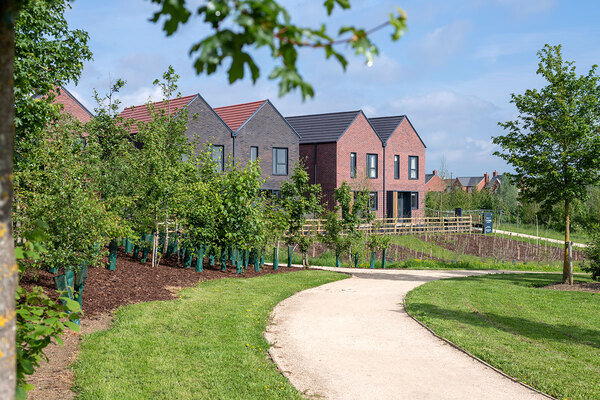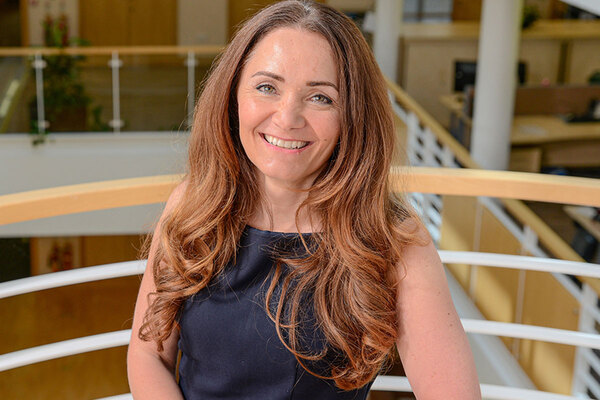You are viewing 1 of your 1 free articles

Brendan is the founding Chair of Sustainability for Housing. He has more than 20 years’ experience as a CEO in the social housing sector,...more
Sustainability standards are key in helping us leverage private finance to deliver our aims
Environmental, social and governance metrics will soon be an essential part of raising finance for housing associations – it is time to get on board, writes Brendan Sarsfield
It’s been six months since the Sustainability Reporting Standard for Social Housing was published. This is the set of standardised reporting criteria that housing associations can use to report on their environmental, social and governance (ESG) performance to lenders.
I am delighted to have been appointed as chair of the Sustainability for Housing board to take this work forward. I’m looking forward to championing housing associations’ social purpose, creating a positive link between associations and the investor community, and helping to get more sustainability linked funding into the sector.
There’s no doubt that this has been a tumultuous time for the sector, with housing associations facing a number of competing challenges as landlords and building owners but also as people who care about the impact we make in our communities. Our actions as social landlords are important and that hugely affect the people we serve.
Whether it is fire safety and the Externall Wall System 1 (EWS1) crisis, reducing homelessness or supporting employees and residents deeply affected by the pandemic, Peabody and the sector’s work to meet the challenges and maximise our positive impact has been relentless during these difficult times.
Longer-term strategic planning around decarbonisation, future service delivery and land-led development and placemaking challenges are also already before us and are the subject of many executive team and board discussions.
Meeting the myriad challenges effectively will be expensive and no doubt high up on housing providers’ risk registers up and down the country. But the challenges and how we respond to them are a huge opportunity to really demonstrate our positive impact, our social and environmental purpose and our efficiency as delivery organisations.
Mitigating the risk means getting on board with the Sustainability Reporting Standard.
In shaping the ESG metrics for the sector, we have learned that we are not alone. The government may not currently see social housing as a great place to invest, but the global ESG revolution means that the finance world – banks and other investors (insurance companies, pension funds, people that buy bonds) – want to invest in and lend to organisations that are a force for good in the world.
They actively seek opportunities to get involved with environmentally and socially responsible, well-governed organisations that have demonstrable impact in people’s lives. That’s us!
In my view, the Sustainability Reporting Standard represents a major step forward in our ability to lever in private capital to help us meet our strategic challenges and deliver our mission.
We are the first, and so far only, sector in the UK to work with banks, lenders and investors to define a comprehensive set of agreed ESG metrics. Close to 100 early adopters and endorsers, including major banks and investors, have already signed up.
All sectors in the economy want a piece of the ESG pie, but we are leading the way and are uniquely placed to report well on the metrics that matter. This can make the cost of borrowing cheaper, the pool of investors wider, and the social and environmental impact of your organisation greater.
The benefits of adopting the standard are already clear, with colleagues in the sector using the metrics to achieve great loan deals – well-priced finance that achieve social or environmental goals in addition to providing money to pay for desperately needed social housing.
We know we have a great story to tell on ESG, but until recently we haven’t always told it well. The standard helps to resolve this by helping landlords tell their fantastic stories in a consistent way, making it easier for lenders looking to make sustainability-linked loans.
For housing associations, the key thing is that they will already have most of the data needed to report on the core criteria – the standard just brings it together in one place. The metrics sit within a wide framework and cover all the great things that organisations are already doing.
Housing associations large and small should be the natural home for good investment, which is why I can’t wait to get started.
“[Investors] actively seek opportunities to get involved with environmentally and socially responsible, well-governed organisations that have demonstrable impact in people’s lives. That’s us”
One of the things I’m keen to do as chair of the Sustainability for Housing board is make sure that the metrics and the standard are always evolving and fit for purpose. That means ensuring they carry on meeting the needs of finance institutions as well as align and reflect changing regulation and the activities of housing associations.
I see a time coming when ESG metrics will be an essential part of getting the funding you need rather than an optional ‘nice to have’ additional stream of cheaper finance. They will become the norm and part of the standard credit assessment process of funders and rating agencies across the board.
So the risk then becomes one of being left behind and unable to access well-priced finance because you haven’t adopted the metrics financiers want to see. The question then becomes, can you afford not to adopt the standards as quickly as you can?
For more information about the reporting standards or the Sustainability for Housing board click here, or you can get in touch with me.
Brendan Sarsfield, chair, Sustainability for Housing board; and outgoing chief executive, Peabody
Sign up for our development and finance newsletter
Already have an account? Click here to manage your newsletters













